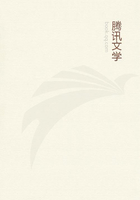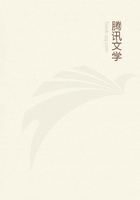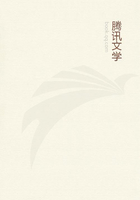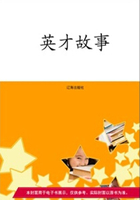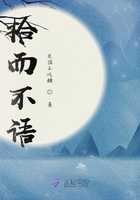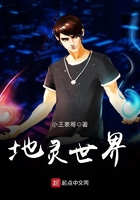This ghastly laughter gives occasion, moreover, for the one strain of tenderness running through the web of this unpleasant story: the love of the blind girl Dea, for the monster. It is a most benignant providence that thus harmoniously brings together these two misfortunes; it is one of those compensations, one of those afterthoughts of a relenting destiny, that reconcile us from time to time to the evil that is in the world; the atmosphere of the book is purified by the presence of this pathetic love; it seems to be above the story somehow, and not of it, as the full moon over the night of some foul and feverish city.
There is here a quality in the narration more intimate and particular than is general with Hugo; but it must be owned, on the other hand, that the book is wordy, and even, now and then, a little wearisome. Ursus and his wolf are pleasant enough companions; but the former is nearly as much an abstract type as the latter. There is a beginning, also, of an abuse of conventional conversation, such as may be quite pardonable in the drama where needs must, but is without excuse in the romance. Lastly, I suppose one must say a word or two about the weak points of this not immaculate novel; and if so, it will be best to distinguish at once. The large family of English blunders, to which we have alluded already in speaking of LES TRAVAILLEURS, are of a sort that is really indifferent in art. If Shakespeare makes his ships cast anchor by some seaport of Bohemia, if Hugo imagines Tom-Tim-Jack to be a likely nickname for an English sailor, or if either Shakespeare, or Hugo, or Scott, for that matter, be guilty of "figments enough to confuse the march of a whole history - anachronisms enough to overset all, chronology,"
(1) the life of their creations, the artistic truth and accuracy of their work, is not so much as compromised. But when we come upon a passage like the sinking of the "Ourque" in this romance, we can do nothing but cover our face with our hands: the conscientious reader feels a sort of disgrace in the very reading. For such artistic falsehoods, springing from what I have called already an unprincipled avidity after effect, no amount of blame can be exaggerated; and above all, when the criminal is such a man as Victor Hugo. We cannot forgive in him what we might have passed over in a third-rate sensation novelist. Little as he seems to know of the sea and nautical affairs, he must have known very well that vessels do not go down as he makes the "Ourque" go down; he must have known that such a liberty with fact was against the laws of the game, and incompatible with all appearance of sincerity in conception or workmanship.
(1) Prefatory letter to PEVERIL OF THE PEAK.
In each of these books, one after another, there has been some departure from the traditional canons of romance; but taking each separately, one would have feared to make too much of these departures, or to found any theory upon what was perhaps purely accidental. The appearance of QUATRE VINGT TREIZE has put us out of the region of such doubt.
Like a doctor who has long been hesitating how to classify an epidemic malady, we have come at last upon a case so well marked that our uncertainty is at an end. It is a novel built upon "a sort of enigma," which was at that date laid before revolutionary France, and which is presented by Hugo to Tellmarch, to Lantenac, to Gauvain, and very terribly to Cimourdain, each of whom gives his own solution of the question, clement or stern, according to the temper of his spirit. That enigma was this: "Can a good action be a bad action? Does not he who spares the wolf kill the sheep?"
This question, as I say, meets with one answer after another during the course of the book, and yet seems to remain undecided to the end. And something in the same way, although one character, or one set of characters, after another comes to the front and occupies our attention for the moment, we never identify our interest with any of these temporary heroes nor regret them after they are withdrawn.
We soon come to regard them somewhat as special cases of a general law; what we really care for is something that they only imply and body forth to us. We know how history continues through century after century; how this king or that patriot disappears from its pages with his whole generation, and yet we do not cease to read, nor do we even feel as if we had reached any legitimate conclusion, because our interest is not in the men, but in the country that they loved or hated, benefited or injured. And so it is here:
Gauvain and Cimourdain pass away, and we regard them no more than the lost armies of which we find the cold statistics in military annals; what we regard is what remains behind; it is the principle that put these men where they were, that filled them for a while with heroic inspiration, and has the power, now that they are fallen, to inspire others with the same courage. The interest of the novel centres about revolutionary France: just as the plot is an abstract judicial difficulty, the hero is an abstract historical force. And this has been done, not, as it would have been before, by the cold and cumbersome machinery of allegory, but with bold, straightforward realism, dealing only with the objective materials of art, and dealing with them so masterfully that the palest abstractions of thought come before us, and move our hopes and fears, as if they were the young men and maidens of customary romance.
The episode of the mother and children in QUATRE VINGT TREIZE is equal to anything that Hugo has ever written. There is one chapter in the second volume, for instance, called "SEIN GUERI, COEUR SAIGNANT," that is full of the very stuff of true tragedy, and nothing could be more delightful than the humours of the three children on the day before the assault.

